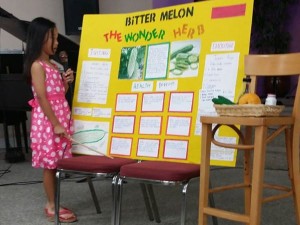Bitter Melon: The Wonder Herb is the title of the science project of Jasmine Capistrano, a seven-year old student. Her project won first place among all the projects submitted in their school. Jasmine’s project has been featured in their school paper. What makes bitter melon a wonder herb?
What Is Bitter Melon
Bitter Melon is a tropical vine widely grown in Asia, Africa and the Carribean for its edible fruit, which tastes bitter. It is considered the most bitter among the fruits. The plant bears yellow flowers and its fruit have a distinct warty exterior and oblong in shape. It has a thin fleshy layer that surrounds a central cavity that contains large flat seeds and pith.
The Health Benefits of Bitter Melon mentioned in Jasmine’s Project are as follows:
- Bitter Melon removes Stomach Worms and highly recommended for kids.
- Bitter Melon is said to be helpful in fighting against Cancer and a number of Infections.
- The juice of the leaf of bitter melon plant is beneficial in the Treatment of Alcoholism.
- Regular consumption of bitter melon has been associated with prevention as well as Treatment of Hypertension.
- Bitter Melon has been associated with lowering sugar levels in people suffering from Diabetes.
- Bitter Melon is believed to be helpful in Preventing Eye problems and Improves Eye-sight.
- Bitter Melon helps improve Circulation and in turn generates Slimming effects on the body.
- Bitter Melon has been known to provide relief from constipation and is also effective in the treatment of Psoriasis.
- Bitter Melon is good for Asthma patients as it Heals Breathing problems.
Nutritional Content of Bitter Melon and their Effect On the Body
- Bitter Melon is low in calories (17 cal/100gm edible portion) but rich in dietary fibers, vitamins, minerals and anti-oxidants.
- Fresh bitter melon is an excellent source of vitamin C (84 mg/100gm edible portion), an amount that meets 140% of the recommended daily intake for this vitamin. Vitamin C is a natural powerful anti-oxidant that help the body scavenge harmful free radicals that may cause cancer development.
- Fresh bitter melon are excellent sources of folates (72 micrograms/100 gm edible portion). Folate is an essential nutrient in the maturation of red blood cells, and eating an adequate amount of this nutrient prevents pernicious anemia.
- Bitter Melon is an excellent source of the flavonoids beta carotene, lutein and zea-zanthin. It also contains a good amount of vitamin A. The flavonoids together with vitamin A act together as protective scavengers to oxygen-derived free radicals that play a role in aging, cancers and other disease processes. In addition, lutein and vitamin A are both good for healthy eye sight.
- The dietary fiber content of bitter melon help in the digestion and the movement of food in the bowel, thus preventing constipation problems.
- Bitter Melon also contains niacin, pantothenic acid, pyridoxine and minerals which include iron, zinc, magnesium, potassium and manganese.
Bitter Melon and Diabetes
Bitter Melon contains a phyto-nutrient called polypeptide –P (so called plant insulin) which is known to lower blood sugar levels. It also composes Charantin, a substance that increases uptake of glucose and the formation of glycogen in the cells of the liver, muscles and fat tissues. These two compounds acting together are thought to be responsible in the reduction of blood sugar in persons with type 2 diabetes.
Word of Caution
Taking too much of Bitter Melon or any kind of food for that matter is not good and may have side effects.
Recommendation
All plant foods have their health benefits and EATING A VARIETY of foods daily is the best way to benefit from the food we eat.


